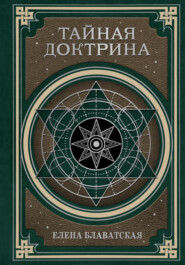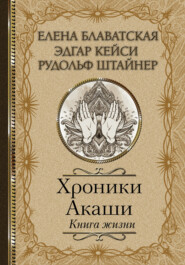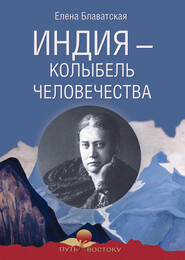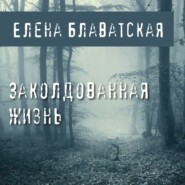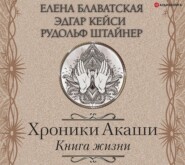По всем вопросам обращайтесь на: info@litportal.ru
(©) 2003-2024.
✖
Nightmare Tales
Настройки чтения
Размер шрифта
Высота строк
Поля
Nightmare Tales
Helena Petrovna Blavatsky
Nightmare Tales
A BEWITCHED LIFE
(As Narrated by a Quill Pen)
Introduction
It was a dark, chilly night in September, 1884. A heavy gloom had descended over the streets of A – , a small town on the Rhine, and was hanging like a black funeral-pall over the dull factory burgh. The greater number of its inhabitants, wearied by their long day’s work, had hours before retired to stretch their tired limbs, and lay their aching heads upon their pillows. All was quiet in the large house; all was quiet in the deserted streets.
I too was lying in my bed; alas, not one of rest, but of pain and sickness, to which I had been confined for some days. So still was everything in the house, that, as Longfellow has it, its stillness seemed almost audible. I could plainly hear the murmur of the blood, as it rushed through my aching body, producing that monotonous singing so familiar to one who lends a watchful ear to silence. I had listened to it until, in my nervous imagination, it had grown into the sound of a distant cataract, the fall of mighty waters … when, suddenly changing its character, the ever growing “singing” merged into other and far more welcome sounds. It was the low, and at first scarce audible, whisper of a human voice. It approached, and gradually strengthening seemed to speak in my very ear. Thus sounds a voice speaking across a blue quiescent lake, in one of those wondrously acoustic gorges of the snow-capped mountains, where the air is so pure that a word pronounced half a mile off seems almost at the elbow. Yes; it was the voice of one whom to know is to reverence; of one, to me, owing to many mystic associations, most dear and holy; a voice familiar for long years and ever welcome: doubly so in hours of mental or physical suffering, for it always brings with it a ray of hope and consolation.
“Courage,” it whispered in gentle, mellow tones. “Think of the days passed by you in sweet associations; of the great lessons received of Nature’s truths; of the many errors of men concerning these truths; and try to add to them the experience of a night in this city. Let the narrative of a strange life, that will interest you, help to shorten the hours of suffering… Give your attention. Look yonder before you!”
“Yonder” meant the clear, large windows of an empty house on the other side of the narrow street of the German town. They faced my own in almost a straight line across the street, and my bed faced the windows of my sleeping room. Obedient to the suggestion, I directed my gaze towards them, and what I saw made me for the time being forget the agony of the pain that racked my swollen arm and rheumatical body.
Over the windows was creeping a mist; a dense, heavy, serpentine, whitish mist, that looked like the huge shadow of a gigantic boa slowly uncoiling its body. Gradually it disappeared, to leave a lustrous light, soft and silvery, as though the window-panes behind reflected a thousand moonbeams, a tropical star-lit sky – first from outside, then from within the empty rooms. Next I saw the mist elongating itself and throwing, as it were, a fairy bridge across the street from the bewitched windows to my own balcony, nay to my very own bed. As I continued gazing, the wall and windows and the opposite house itself, suddenly vanished. The space occupied by the empty rooms had changed into the interior of another smaller room, in what I knew to be a Swiss châlet – into a study, whose old, dark walls were covered from floor to ceiling with book shelves on which were many antiquated folios, as well as works of a more recent date. In the center stood a large old-fashioned table, littered over with manuscripts and writing materials. Before it, quill-pen in hand, sat an old man; a grim-looking, skeleton-like personage, with a face so thin, so pale, yellow and emaciated, that the light of the solitary little student’s lamp was reflected in two shining spots on his high cheek-bones, as though they were carved out of ivory.
As I tried to get a better view of him by slowly raising myself upon my pillows, the whole vision, châlet and study, desk, books and scribe, seemed to flicker and move. Once set in motion they approached nearer and nearer, until, gliding noiselessly along the fleecy bridge of clouds across the street, they floated through the closed windows into my room and finally seemed to settle beside my bed.
“Listen to what he thinks and is going to write” – said in soothing tones the same familiar, far off, and yet near voice. “Thus you will hear a narrative, the telling of which may help to shorten the long sleepless hours, and even make you forget for a while your pain… Try!” – it added, using the well-known Rosicrucian and Kabalistic formula.
I tried, doing as I was bid. I centered all my attention on the solitary laborious figure that I saw before me, but which did not see me. At first, the noise of the quill-pen with which the old man was writing, suggested to my mind nothing more than a low whispered murmur of a nondescript nature. Then, gradually, my ear caught the indistinct words of a faint and distant voice, and I thought the figure before me, bending over its manuscript, was reading its tale aloud instead of writing it. But I soon found out my error. For casting my gaze at the old scribe’s face, I saw at a glance that his lips were compressed and motionless, and the voice too thin and shrill to be his voice. Stranger still, at every word traced by the feeble, aged hand, I noticed a light flashing from under his pen, a bright colored spark that became instantaneously a sound, or – what is the same thing – it seemed to do so to my inner perceptions. It was indeed the small voice of the quill that I heard, though scribe and pen were at the time, perchance, hundreds of miles away from Germany. Such things will happen occasionally, especially at night, beneath whose starry shade, as Byron tells us, we
… learn the language of another world …
However it may be, the words uttered by the quill remained in my memory for days after. Nor had I any great difficulty in retaining them, for when I sat down to record the story, I found it, as usual, indelibly impressed on the astral tablets before my inner eye.
Thus, I had but to copy it and so give it as I received it. I failed to learn the name of the unknown nocturnal writer. Nevertheless, though the reader may prefer to regard the whole story as one made up for the occasion, a dream, perhaps, still its incidents will, I hope, prove none the less interesting.
I
The Stranger’s Story
My birth-place is a small mountain hamlet, a cluster of Swiss cottages, hidden deep in a sunny nook, between two tumble-down glaciers and a peak covered with eternal snows. Thither, thirty-seven years ago, I returned – crippled mentally and physically – to die, if death would only have me. The pure invigorating air of my birth-place decided otherwise. I am still alive; perhaps for the purpose of giving evidence to facts I have kept profoundly secret from all – a tale of horror I would rather hide than reveal. The reason for this unwillingness on my part is due to my early education, and to subsequent events that gave the lie to my most cherished prejudices. Some people might be inclined to regard these events as providential: I, however, believe in no Providence, and yet am unable to attribute them to mere chance. I connect them as the ceaseless evolution of effects, engendered by certain direct causes, with one primary and fundamental cause, from which ensued all that followed. A feeble old man am I now, yet physical weakness has in no way impaired my mental faculties. I remember the smallest details of that terrible cause, which engendered such fatal results. It is these which furnish me with an additional proof of the actual existence of one whom I fain would regard – oh, that I could do so! – as a creature born of my fancy, the evanescent production of a feverish, horrid dream! Oh that terrible, mild and all-forgiving, that saintly and respected Being! It was that paragon of all the virtues who embittered my whole existence. It is he, who, pushing me violently out of the monotonous but secure groove of daily life, was the first to force upon me the certitude of a life hereafter, thus adding an additional horror to one already great enough.
With a view to a clearer comprehension of the situation, I must interrupt these recollections with a few words about myself. Oh how, if I could, would I obliterate that hated Self!
Born in Switzerland, of French parents, who centered the whole world-wisdom in the literary trinity of Voltaire, J. J. Rousseau and D’Holbach, and educated in a German university, I grew up a thorough materialist, a confirmed atheist. I could never have even pictured to myself any beings – least of all a Being – above or even outside visible nature, as distinguished from her. Hence I regarded everything that could not be brought under the strictest analysis of the physical senses as a mere chimera. A soul, I argued, even supposing man has one, must be material. According to Origen’s definition, incorporeus[1 - ἀσώματος.]– the epithet he gave to his God – signifies a substance only more subtle than that of physical bodies, of which, at best, we can form no definite idea. How then can that, of which our senses cannot enable us to obtain any clear knowledge, how can that make itself visible or produce any tangible manifestations?
Accordingly, I received the tales of nascent Spiritualism with a feeling of utter contempt, and regarded the overtures made by certain priests with derision, often akin to anger. And indeed the latter feeling has never entirely abandoned me.
Pascal, in the eighth Act of his “Thoughts,” confesses to a most complete incertitude upon the existence of God. Throughout my life, I too professed a complete certitude as to the non-existence of any such extra-cosmic being, and repeated with that great thinker the memorable words in which he tells us: “I have examined if this God of whom all the world speaks might not have left some marks of himself. I look everywhere, and everywhere I see nothing but obscurity. Nature offers me nothing that may not be a matter of doubt and inquietude.” Nor have I found to this day anything that might unsettle me in precisely similar and even stronger feelings. I have never believed, nor shall I ever believe, in a Supreme Being. But at the potentialities of man, proclaimed far and wide in the East, powers so developed in some persons as to make them virtually Gods, at them I laugh no more. My whole broken life is a protest against such negation. I believe in such phenomena, and – I curse them, whenever they come, and by whatsoever means generated.
On the death of my parents, owing to an unfortunate lawsuit, I lost the greater part of my fortune, and resolved – for the sake of those I loved best, rather than for my own – to make another for myself. My elder sister, whom I adored, had married a poor man. I accepted the offer of a rich Hamburg firm and sailed for Japan as its junior partner.
For several years my business went on successfully. I got into the confidence of many influential Japanese, through whose protection I was enabled to travel and transact business in many localities, which, in those days especially, were not easily accessible to foreigners. Indifferent to every religion, I became interested in the philosophy of Buddhism, the only religious system I thought worthy of being called philosophical. Thus, in my moments of leisure, I visited the most remarkable temples of Japan, the most important and curious of the ninety-six Buddhist monasteries of Kioto. I have examined in turn Day-Bootzoo, with its gigantic bell; Tzeonene, Enarino-Yassero, Kie-Missoo, Higadzi-Hong-Vonsi, and many other famous temples.
Several years passed away, and during that whole period I was not cured of my scepticism, nor did I ever contemplate having my opinions on this subject altered. I derided the pretentions of the Japanese bonzes and ascetics, as I had those of Christian priests and European Spiritualists. I could not believe in the acquisition of powers unknown to, and never studied by, men of science; hence I scoffed at all such ideas. The superstitious and atrabilious Buddhist, teaching us to shun the pleasures of life, to put to rout one’s passions, to render oneself insensible alike to happiness and suffering, in order to acquire such chimerical powers – seemed supremely ridiculous in my eyes.
On a day for ever memorable to me – a fatal day – I made the acquaintance of a venerable and learned Bonze, a Japanese priest, named Tamoora Hideyeri. I met him at the foot of the golden Kwon-On, and from that moment he became my best and most trusted friend. Notwithstanding my great and genuine regard for him, however, whenever a good opportunity was offered I never failed to mock his religious convictions, thereby very often hurting his feelings.
But my old friend was as meek and forgiving as any true Buddhist’s heart might desire. He never resented my impatient sarcasms, even when they were, to say the least, of equivocal propriety, and generally limited his replies to the “wait and see” kind of protest. Nor could he be brought to seriously believe in the sincerity of my denial of the existence of any God or Gods. The full meaning of the terms “atheism” and “scepticism” was beyond the comprehension of his otherwise extremely intellectual and acute mind. Like certain reverential Christians, he seemed incapable of realizing that any man of sense should prefer the wise conclusions arrived at by philosophy and modern science to a ridiculous belief in an invisible world full of Gods and spirits, dzins and demons. “Man is a spiritual being,” he insisted, “who returns to earth more than once, and is rewarded or punished in the between times.” The proposition that man is nothing else but a heap of organized dust, was beyond him. Like Jeremy Collier, he refused to admit that he was no better than “a stalking machine, a speaking head without a soul in it,” whose “thoughts are all bound by the laws of motion.” “For,” he argued, “if my actions were, as you say, prescribed beforehand, and I had no more liberty or free will to change the course of my action than the running waters of the river yonder, then the glorious doctrine of Karma, of merit and demerit, would be foolishness indeed.”
Thus the whole of my hyper-metaphysical friend’s ontology rested on the shaky superstructure of metempsychosis, of a fancied “just” Law of Retribution, and other such equally absurd dreams.
“We cannot,” said he paradoxically one day, “hope to live hereafter in the full enjoyment of our consciousness, unless we have built for it beforehand a firm and solid foundation of spirituality… Nay, laugh not, friend of no faith,” he meekly pleaded, “but rather think and reflect on this. One who has never taught himself to live in Spirit during his conscious and responsible life on earth, can hardly hope to enjoy a sentient existence after death, when, deprived of his body, he is limited to that Spirit alone.”
“What can you mean by life in Spirit?” – I inquired.
“Life on a spiritual plane; that which the Buddhists call Tushita Devaloka (Paradise). Man can create such a blissful existence for himself between two births, by the gradual transference on to that plane of all the faculties which during his sojourn on earth manifest through his organic body and, as you call it, animal brain.”…
“How absurd! And how can man do this?”
“Contemplation and a strong desire to assimilate the blessed Gods, will enable him to do so.”
“And if man refuses this intellectual occupation, by which you mean, I suppose, the fixing of the eyes on the tip of his nose, what becomes of him after the death of his body?” was my mocking question.
“He will be dealt with according to the prevailing state of his consciousness, of which there are many grades. At best – immediate rebirth; at worst – the state of avitchi, a mental hell. Yet one need not be an ascetic to assimilate spiritual life which will extend to the hereafter. All that is required is to try to approach Spirit.”
“How so? Even when disbelieving in it?” – I rejoined.
“Even so! One may disbelieve and yet harbor in one’s nature room for doubt, however small that room may be, and thus try one day, were it but for one moment, to open the door of the inner temple; and this will prove sufficient for the purpose.”
“You are decidedly poetical, and paradoxical to boot, reverend sir. Will you kindly explain to me a little more of the mystery?”
“There is none; still I am willing. Suppose for a moment that some unknown temple to which you have never been before, and the existence of which you think you have reasons to deny, is the ‘spiritual plane’ of which I am speaking. Some one takes you by the hand and leads you towards its entrance, curiosity makes you open its door and look within. By this simple act, by entering it for one second, you have established an everlasting connexion between your consciousness and the temple. You cannot deny its existence any longer, nor obliterate the fact of your having entered it. And according to the character and the variety of your work, within its holy precincts, so will you live in it after your consciousness is severed from its dwelling of flesh.”
“What do you mean? And what has my after-death consciousness – if such a thing exists – to do with the temple?”
“It has everything to do with it,” solemnly rejoined the old man. “There can be no self-consciousness after death outside the temple of spirit. That which you will have done within its plane will alone survive. All the rest is false and an illusion. It is doomed to perish in the Ocean of Mâyâ.”
Amused at the idea of living outside one’s body, I urged on my old friend to tell me more. Mistaking my meaning, the venerable man willingly consented.
Tamoora Hideyeri belonged to the great temple of Tzi-Onene, a Buddhist monastery, famous not only in all Japan, but also throughout Tibet and China. No other is so venerated in Kioto. Its monks belong to the sect of Dzeno-doo, and are considered as the most learned among the many erudite fraternities. They are, moreover, closely connected and allied with the Yamabooshi (the ascetics, or hermits), who follow the doctrines of Lao-tze. No wonder, that at the slightest provocation on my part the priest flew into the highest metaphysics, hoping thereby to cure me of my infidelity.
No use repeating here the long rigmarole of the most hopelessly involved and incomprehensible of all doctrines. According to his ideas, we have to train ourselves for spirituality in another world – as for gymnastics. Carrying on the analogy between the temple and the “spiritual plane” he tried to illustrate his idea. He had himself worked in the temple of Spirit two-thirds of his life, and given several hours daily to “contemplation.” Thus he knew (?!) that after he had laid aside his mortal casket, “a mere illusion,” he explained – he would in his spiritual consciousness live over again every feeling of ennobling joy and divine bliss he had ever had, or ought to have had– only a hundred-fold intensified. His work on the spirit-plane had been considerable, he said, and he hoped, therefore, that the wages of the laborer would prove proportionate.
“But suppose the laborer, as in the example you have just brought forward in my case, should have no more than opened the temple door out of mere curiosity; had only peeped into the sanctuary never to set his foot therein again. What then?”
“Then,” he answered, “you would have only this short minute to record in your future self-consciousness and no more. Our life hereafter records and repeats but the impressions and feelings we have had in our spiritual experiences and nothing else. Thus, if instead of reverence at the moment of entering the abode of Spirit, you had been harboring in your heart anger, jealousy or grief, then your future spiritual life would be a sad one, in truth. There would be nothing to record, save the opening of a door in a fit of bad temper.”
“How then could it be repeated?” – I insisted, highly amused. “What do you suppose I would be doing before incarnating again?”
“In that case,” he said, speaking slowly and weighing every word – “in that case, you would have, I fear, only to open and shut the temple door, over and over again, during a period which, however short, would seem to you an eternity.”
This kind of after-death occupation appeared to me, at that time, so grotesque in its sublime absurdity, that I was seized with an almost inextinguishable fit of laughter.
Helena Petrovna Blavatsky
Nightmare Tales
A BEWITCHED LIFE
(As Narrated by a Quill Pen)
Introduction
It was a dark, chilly night in September, 1884. A heavy gloom had descended over the streets of A – , a small town on the Rhine, and was hanging like a black funeral-pall over the dull factory burgh. The greater number of its inhabitants, wearied by their long day’s work, had hours before retired to stretch their tired limbs, and lay their aching heads upon their pillows. All was quiet in the large house; all was quiet in the deserted streets.
I too was lying in my bed; alas, not one of rest, but of pain and sickness, to which I had been confined for some days. So still was everything in the house, that, as Longfellow has it, its stillness seemed almost audible. I could plainly hear the murmur of the blood, as it rushed through my aching body, producing that monotonous singing so familiar to one who lends a watchful ear to silence. I had listened to it until, in my nervous imagination, it had grown into the sound of a distant cataract, the fall of mighty waters … when, suddenly changing its character, the ever growing “singing” merged into other and far more welcome sounds. It was the low, and at first scarce audible, whisper of a human voice. It approached, and gradually strengthening seemed to speak in my very ear. Thus sounds a voice speaking across a blue quiescent lake, in one of those wondrously acoustic gorges of the snow-capped mountains, where the air is so pure that a word pronounced half a mile off seems almost at the elbow. Yes; it was the voice of one whom to know is to reverence; of one, to me, owing to many mystic associations, most dear and holy; a voice familiar for long years and ever welcome: doubly so in hours of mental or physical suffering, for it always brings with it a ray of hope and consolation.
“Courage,” it whispered in gentle, mellow tones. “Think of the days passed by you in sweet associations; of the great lessons received of Nature’s truths; of the many errors of men concerning these truths; and try to add to them the experience of a night in this city. Let the narrative of a strange life, that will interest you, help to shorten the hours of suffering… Give your attention. Look yonder before you!”
“Yonder” meant the clear, large windows of an empty house on the other side of the narrow street of the German town. They faced my own in almost a straight line across the street, and my bed faced the windows of my sleeping room. Obedient to the suggestion, I directed my gaze towards them, and what I saw made me for the time being forget the agony of the pain that racked my swollen arm and rheumatical body.
Over the windows was creeping a mist; a dense, heavy, serpentine, whitish mist, that looked like the huge shadow of a gigantic boa slowly uncoiling its body. Gradually it disappeared, to leave a lustrous light, soft and silvery, as though the window-panes behind reflected a thousand moonbeams, a tropical star-lit sky – first from outside, then from within the empty rooms. Next I saw the mist elongating itself and throwing, as it were, a fairy bridge across the street from the bewitched windows to my own balcony, nay to my very own bed. As I continued gazing, the wall and windows and the opposite house itself, suddenly vanished. The space occupied by the empty rooms had changed into the interior of another smaller room, in what I knew to be a Swiss châlet – into a study, whose old, dark walls were covered from floor to ceiling with book shelves on which were many antiquated folios, as well as works of a more recent date. In the center stood a large old-fashioned table, littered over with manuscripts and writing materials. Before it, quill-pen in hand, sat an old man; a grim-looking, skeleton-like personage, with a face so thin, so pale, yellow and emaciated, that the light of the solitary little student’s lamp was reflected in two shining spots on his high cheek-bones, as though they were carved out of ivory.
As I tried to get a better view of him by slowly raising myself upon my pillows, the whole vision, châlet and study, desk, books and scribe, seemed to flicker and move. Once set in motion they approached nearer and nearer, until, gliding noiselessly along the fleecy bridge of clouds across the street, they floated through the closed windows into my room and finally seemed to settle beside my bed.
“Listen to what he thinks and is going to write” – said in soothing tones the same familiar, far off, and yet near voice. “Thus you will hear a narrative, the telling of which may help to shorten the long sleepless hours, and even make you forget for a while your pain… Try!” – it added, using the well-known Rosicrucian and Kabalistic formula.
I tried, doing as I was bid. I centered all my attention on the solitary laborious figure that I saw before me, but which did not see me. At first, the noise of the quill-pen with which the old man was writing, suggested to my mind nothing more than a low whispered murmur of a nondescript nature. Then, gradually, my ear caught the indistinct words of a faint and distant voice, and I thought the figure before me, bending over its manuscript, was reading its tale aloud instead of writing it. But I soon found out my error. For casting my gaze at the old scribe’s face, I saw at a glance that his lips were compressed and motionless, and the voice too thin and shrill to be his voice. Stranger still, at every word traced by the feeble, aged hand, I noticed a light flashing from under his pen, a bright colored spark that became instantaneously a sound, or – what is the same thing – it seemed to do so to my inner perceptions. It was indeed the small voice of the quill that I heard, though scribe and pen were at the time, perchance, hundreds of miles away from Germany. Such things will happen occasionally, especially at night, beneath whose starry shade, as Byron tells us, we
… learn the language of another world …
However it may be, the words uttered by the quill remained in my memory for days after. Nor had I any great difficulty in retaining them, for when I sat down to record the story, I found it, as usual, indelibly impressed on the astral tablets before my inner eye.
Thus, I had but to copy it and so give it as I received it. I failed to learn the name of the unknown nocturnal writer. Nevertheless, though the reader may prefer to regard the whole story as one made up for the occasion, a dream, perhaps, still its incidents will, I hope, prove none the less interesting.
I
The Stranger’s Story
My birth-place is a small mountain hamlet, a cluster of Swiss cottages, hidden deep in a sunny nook, between two tumble-down glaciers and a peak covered with eternal snows. Thither, thirty-seven years ago, I returned – crippled mentally and physically – to die, if death would only have me. The pure invigorating air of my birth-place decided otherwise. I am still alive; perhaps for the purpose of giving evidence to facts I have kept profoundly secret from all – a tale of horror I would rather hide than reveal. The reason for this unwillingness on my part is due to my early education, and to subsequent events that gave the lie to my most cherished prejudices. Some people might be inclined to regard these events as providential: I, however, believe in no Providence, and yet am unable to attribute them to mere chance. I connect them as the ceaseless evolution of effects, engendered by certain direct causes, with one primary and fundamental cause, from which ensued all that followed. A feeble old man am I now, yet physical weakness has in no way impaired my mental faculties. I remember the smallest details of that terrible cause, which engendered such fatal results. It is these which furnish me with an additional proof of the actual existence of one whom I fain would regard – oh, that I could do so! – as a creature born of my fancy, the evanescent production of a feverish, horrid dream! Oh that terrible, mild and all-forgiving, that saintly and respected Being! It was that paragon of all the virtues who embittered my whole existence. It is he, who, pushing me violently out of the monotonous but secure groove of daily life, was the first to force upon me the certitude of a life hereafter, thus adding an additional horror to one already great enough.
With a view to a clearer comprehension of the situation, I must interrupt these recollections with a few words about myself. Oh how, if I could, would I obliterate that hated Self!
Born in Switzerland, of French parents, who centered the whole world-wisdom in the literary trinity of Voltaire, J. J. Rousseau and D’Holbach, and educated in a German university, I grew up a thorough materialist, a confirmed atheist. I could never have even pictured to myself any beings – least of all a Being – above or even outside visible nature, as distinguished from her. Hence I regarded everything that could not be brought under the strictest analysis of the physical senses as a mere chimera. A soul, I argued, even supposing man has one, must be material. According to Origen’s definition, incorporeus[1 - ἀσώματος.]– the epithet he gave to his God – signifies a substance only more subtle than that of physical bodies, of which, at best, we can form no definite idea. How then can that, of which our senses cannot enable us to obtain any clear knowledge, how can that make itself visible or produce any tangible manifestations?
Accordingly, I received the tales of nascent Spiritualism with a feeling of utter contempt, and regarded the overtures made by certain priests with derision, often akin to anger. And indeed the latter feeling has never entirely abandoned me.
Pascal, in the eighth Act of his “Thoughts,” confesses to a most complete incertitude upon the existence of God. Throughout my life, I too professed a complete certitude as to the non-existence of any such extra-cosmic being, and repeated with that great thinker the memorable words in which he tells us: “I have examined if this God of whom all the world speaks might not have left some marks of himself. I look everywhere, and everywhere I see nothing but obscurity. Nature offers me nothing that may not be a matter of doubt and inquietude.” Nor have I found to this day anything that might unsettle me in precisely similar and even stronger feelings. I have never believed, nor shall I ever believe, in a Supreme Being. But at the potentialities of man, proclaimed far and wide in the East, powers so developed in some persons as to make them virtually Gods, at them I laugh no more. My whole broken life is a protest against such negation. I believe in such phenomena, and – I curse them, whenever they come, and by whatsoever means generated.
On the death of my parents, owing to an unfortunate lawsuit, I lost the greater part of my fortune, and resolved – for the sake of those I loved best, rather than for my own – to make another for myself. My elder sister, whom I adored, had married a poor man. I accepted the offer of a rich Hamburg firm and sailed for Japan as its junior partner.
For several years my business went on successfully. I got into the confidence of many influential Japanese, through whose protection I was enabled to travel and transact business in many localities, which, in those days especially, were not easily accessible to foreigners. Indifferent to every religion, I became interested in the philosophy of Buddhism, the only religious system I thought worthy of being called philosophical. Thus, in my moments of leisure, I visited the most remarkable temples of Japan, the most important and curious of the ninety-six Buddhist monasteries of Kioto. I have examined in turn Day-Bootzoo, with its gigantic bell; Tzeonene, Enarino-Yassero, Kie-Missoo, Higadzi-Hong-Vonsi, and many other famous temples.
Several years passed away, and during that whole period I was not cured of my scepticism, nor did I ever contemplate having my opinions on this subject altered. I derided the pretentions of the Japanese bonzes and ascetics, as I had those of Christian priests and European Spiritualists. I could not believe in the acquisition of powers unknown to, and never studied by, men of science; hence I scoffed at all such ideas. The superstitious and atrabilious Buddhist, teaching us to shun the pleasures of life, to put to rout one’s passions, to render oneself insensible alike to happiness and suffering, in order to acquire such chimerical powers – seemed supremely ridiculous in my eyes.
On a day for ever memorable to me – a fatal day – I made the acquaintance of a venerable and learned Bonze, a Japanese priest, named Tamoora Hideyeri. I met him at the foot of the golden Kwon-On, and from that moment he became my best and most trusted friend. Notwithstanding my great and genuine regard for him, however, whenever a good opportunity was offered I never failed to mock his religious convictions, thereby very often hurting his feelings.
But my old friend was as meek and forgiving as any true Buddhist’s heart might desire. He never resented my impatient sarcasms, even when they were, to say the least, of equivocal propriety, and generally limited his replies to the “wait and see” kind of protest. Nor could he be brought to seriously believe in the sincerity of my denial of the existence of any God or Gods. The full meaning of the terms “atheism” and “scepticism” was beyond the comprehension of his otherwise extremely intellectual and acute mind. Like certain reverential Christians, he seemed incapable of realizing that any man of sense should prefer the wise conclusions arrived at by philosophy and modern science to a ridiculous belief in an invisible world full of Gods and spirits, dzins and demons. “Man is a spiritual being,” he insisted, “who returns to earth more than once, and is rewarded or punished in the between times.” The proposition that man is nothing else but a heap of organized dust, was beyond him. Like Jeremy Collier, he refused to admit that he was no better than “a stalking machine, a speaking head without a soul in it,” whose “thoughts are all bound by the laws of motion.” “For,” he argued, “if my actions were, as you say, prescribed beforehand, and I had no more liberty or free will to change the course of my action than the running waters of the river yonder, then the glorious doctrine of Karma, of merit and demerit, would be foolishness indeed.”
Thus the whole of my hyper-metaphysical friend’s ontology rested on the shaky superstructure of metempsychosis, of a fancied “just” Law of Retribution, and other such equally absurd dreams.
“We cannot,” said he paradoxically one day, “hope to live hereafter in the full enjoyment of our consciousness, unless we have built for it beforehand a firm and solid foundation of spirituality… Nay, laugh not, friend of no faith,” he meekly pleaded, “but rather think and reflect on this. One who has never taught himself to live in Spirit during his conscious and responsible life on earth, can hardly hope to enjoy a sentient existence after death, when, deprived of his body, he is limited to that Spirit alone.”
“What can you mean by life in Spirit?” – I inquired.
“Life on a spiritual plane; that which the Buddhists call Tushita Devaloka (Paradise). Man can create such a blissful existence for himself between two births, by the gradual transference on to that plane of all the faculties which during his sojourn on earth manifest through his organic body and, as you call it, animal brain.”…
“How absurd! And how can man do this?”
“Contemplation and a strong desire to assimilate the blessed Gods, will enable him to do so.”
“And if man refuses this intellectual occupation, by which you mean, I suppose, the fixing of the eyes on the tip of his nose, what becomes of him after the death of his body?” was my mocking question.
“He will be dealt with according to the prevailing state of his consciousness, of which there are many grades. At best – immediate rebirth; at worst – the state of avitchi, a mental hell. Yet one need not be an ascetic to assimilate spiritual life which will extend to the hereafter. All that is required is to try to approach Spirit.”
“How so? Even when disbelieving in it?” – I rejoined.
“Even so! One may disbelieve and yet harbor in one’s nature room for doubt, however small that room may be, and thus try one day, were it but for one moment, to open the door of the inner temple; and this will prove sufficient for the purpose.”
“You are decidedly poetical, and paradoxical to boot, reverend sir. Will you kindly explain to me a little more of the mystery?”
“There is none; still I am willing. Suppose for a moment that some unknown temple to which you have never been before, and the existence of which you think you have reasons to deny, is the ‘spiritual plane’ of which I am speaking. Some one takes you by the hand and leads you towards its entrance, curiosity makes you open its door and look within. By this simple act, by entering it for one second, you have established an everlasting connexion between your consciousness and the temple. You cannot deny its existence any longer, nor obliterate the fact of your having entered it. And according to the character and the variety of your work, within its holy precincts, so will you live in it after your consciousness is severed from its dwelling of flesh.”
“What do you mean? And what has my after-death consciousness – if such a thing exists – to do with the temple?”
“It has everything to do with it,” solemnly rejoined the old man. “There can be no self-consciousness after death outside the temple of spirit. That which you will have done within its plane will alone survive. All the rest is false and an illusion. It is doomed to perish in the Ocean of Mâyâ.”
Amused at the idea of living outside one’s body, I urged on my old friend to tell me more. Mistaking my meaning, the venerable man willingly consented.
Tamoora Hideyeri belonged to the great temple of Tzi-Onene, a Buddhist monastery, famous not only in all Japan, but also throughout Tibet and China. No other is so venerated in Kioto. Its monks belong to the sect of Dzeno-doo, and are considered as the most learned among the many erudite fraternities. They are, moreover, closely connected and allied with the Yamabooshi (the ascetics, or hermits), who follow the doctrines of Lao-tze. No wonder, that at the slightest provocation on my part the priest flew into the highest metaphysics, hoping thereby to cure me of my infidelity.
No use repeating here the long rigmarole of the most hopelessly involved and incomprehensible of all doctrines. According to his ideas, we have to train ourselves for spirituality in another world – as for gymnastics. Carrying on the analogy between the temple and the “spiritual plane” he tried to illustrate his idea. He had himself worked in the temple of Spirit two-thirds of his life, and given several hours daily to “contemplation.” Thus he knew (?!) that after he had laid aside his mortal casket, “a mere illusion,” he explained – he would in his spiritual consciousness live over again every feeling of ennobling joy and divine bliss he had ever had, or ought to have had– only a hundred-fold intensified. His work on the spirit-plane had been considerable, he said, and he hoped, therefore, that the wages of the laborer would prove proportionate.
“But suppose the laborer, as in the example you have just brought forward in my case, should have no more than opened the temple door out of mere curiosity; had only peeped into the sanctuary never to set his foot therein again. What then?”
“Then,” he answered, “you would have only this short minute to record in your future self-consciousness and no more. Our life hereafter records and repeats but the impressions and feelings we have had in our spiritual experiences and nothing else. Thus, if instead of reverence at the moment of entering the abode of Spirit, you had been harboring in your heart anger, jealousy or grief, then your future spiritual life would be a sad one, in truth. There would be nothing to record, save the opening of a door in a fit of bad temper.”
“How then could it be repeated?” – I insisted, highly amused. “What do you suppose I would be doing before incarnating again?”
“In that case,” he said, speaking slowly and weighing every word – “in that case, you would have, I fear, only to open and shut the temple door, over and over again, during a period which, however short, would seem to you an eternity.”
This kind of after-death occupation appeared to me, at that time, so grotesque in its sublime absurdity, that I was seized with an almost inextinguishable fit of laughter.






